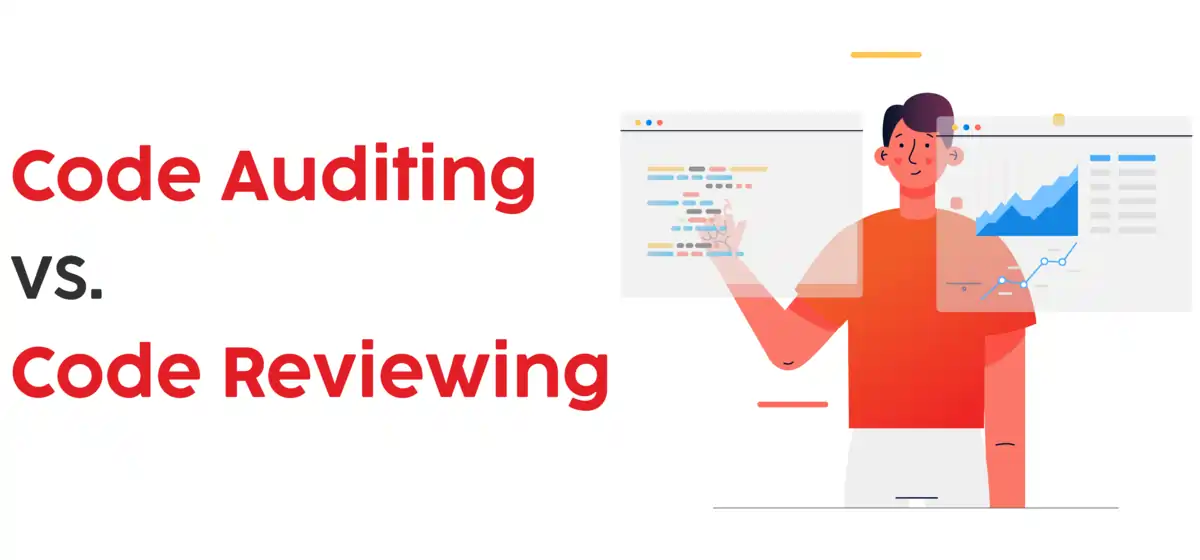Code auditing and code reviewing both are focused on enhancing the software quality, but their objectives are as follows: Code auditing concerns itself with security vulnerabilities and compliance breaches, while code reviewing deals with code faults, code readability and adherence to the laid down code standard. Collectively they provide code dependability and security
Highlights
An enthusiastic developer and skilled business management expert with over a decade of experience in the field

In the world of improvement, keeping code accurate, stable, and aligned with mission goals is important. Two commonly used strategies in this process are code auditing and code reviewing. Though they share a comparable motive, they have awesome techniques, scopes, and targets. This article will discuss the differences between code auditing and code review in the contexts of custom website development and mobile app development, presenting a clear knowledge of their particular contributions to building high-quality applications.
Both code auditing and code reviewing play important roles in reading code. While both techniques inspect code quality, they have different key points.
Code Auditing and Code Reviewing are both aimed at quality control but address different needs in the development cycle.
Unlock your business's full potential! Discover Digittrix's insights on custom web development and take your business to the next level.
For example, a mobile app code audit might be conducted before launching an app, while code reviews would occur multiple times during the app’s development.
Each method is suited to different stages in a development project:
Code auditing is most beneficial for applications that work with user data, such as e-commerce websites or financial platforms. Security checks are very important in these audits to reduce the chance of security breakings. Auditors look for such an opportunity as no effective encryption method. Some of the most important security audits include:
When auditing website code, you may need to ensure that data privacy is maintained, or may want to protect against SQL injection or cross-site scripting.
Code reviewing is more collaborative and allows team members to check each other's work. This helps to achieve the clean code style, readability and consistency of the code. Typical aspects of the code reviewed include:
Mobile app code reviewing is especially effective since agile development introduces new code frequently. Early code reviews can save money by catching issues before they become costly by pointing out potential problems early enough before they become deeper.
There are different tools available for code auditing and reviewing, which simplify these processes.
Code auditing and code reviewing include a strong approach to ensure high-security and quality applications are developed. Their combined benefits include:
When integrated, both of these practices ensure that a custom website development team provides fully secure and optimized websites for maximum real-world capabilities.
In other words, it could be concluded that both auditing and code review are very important in producing quality code. Where code auditing is a deep and security-focused approach similar to compliance code review, it is a regular practice to ensure code quality and standards. Integrating both into the development process enables mobile app developers to create secure, high-performance apps that meet user demands.
Considering them in web or mobile app development projects not only makes the code strong but also improves the overall project and security.
In today’s digital landscape, understanding the difference between code auditing and code reviewing is important for building reliable, high-performing platforms. Both practices play pivotal roles in enhancing code quality, yet they serve distinct purposes within development processes. At Digittrix, we help organizations navigate these differences to ensure their code is both secure and efficient.
With over 14 years of experience, Digittrix specializes in both code auditing and reviewing. Our commitment to code quality ensures efficient reporting, secure access, and seamless usability for your platforms. Ready to boost your platform's performance and security? Contact us at +91 8727000867
or email digittrix@gmail.com.

Do you need help in Web Development ?




Join over 1500+ businesses we've already helped!
Code auditing is an in-depth examination of code to identify security vulnerabilities, compliance issues, and performance inefficiencies, often done before deployment.
Code reviewing allows team members to check new code for quality, readability, and adherence to standards, reducing errors early in the development process.
While code auditing focuses on security and compliance in complete code, code reviewing is a peer process that checks for bugs and quality in newly written code.
Yes, using both methods together improves software security and code quality, ensuring that both standards and best practices are followed throughout development.

©2026Digittrix Infotech Private Limited , All rights reserved.